
Everything passes, only truth remains
Neutrals Special Issue
Sorry, this is a belated special issue of Neutrals.
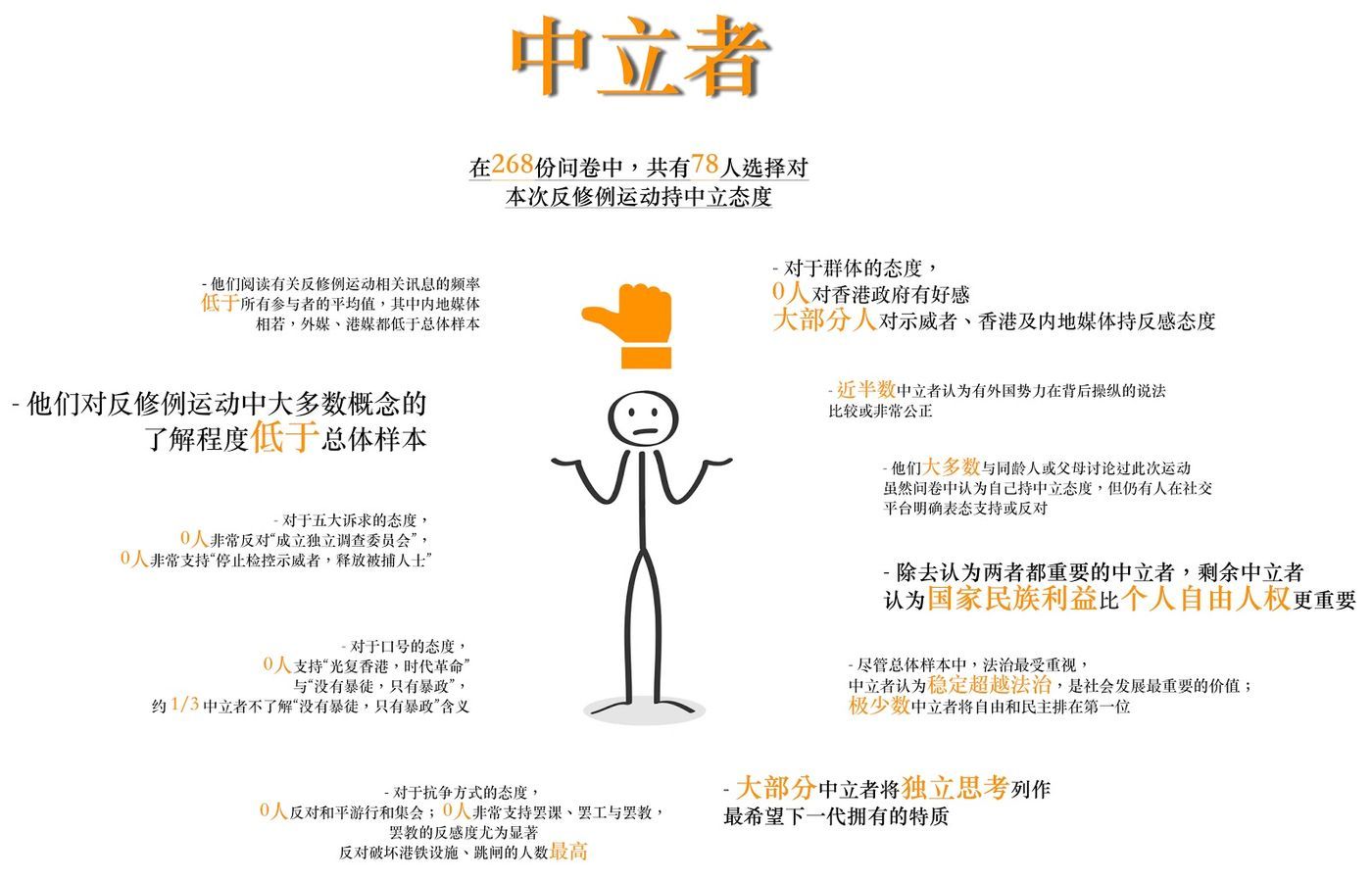
*Collection period: September 8th - September 19th
*Number of samples = 268
*Collection method: published in a snowball manner through the Facebook Page of the research team, the circle of friends of the research members, and the WeChat group of mainland students
We think there are deficiencies:
- Our sample size is 268 people. They are all mainland students who have studied or have studied at Chinese University. There are slightly more undergraduate students in the third and fourth grades, which may not fully represent the overall mainland students in Hong Kong.
- We adopted the sampling method of sharing questionnaires on social media platforms, that is, "snowballing", and failed to achieve random sampling, which also weakened the representativeness of the sample. Since we are a student body, we lack the resources and funding to do a perfect random sample survey. We have done our best to promote and finally collected 268 samples.
- Respondents filled out the questionnaire spontaneously through a no-reward mechanism. We cannot ignore the potential correlation between their own political participation and willingness to fill out - mainland students willing to participate in this survey for free may be interested in the subject of this questionnaire themselves. This also affects the representativeness of the sample.
Among the 268 questionnaires, a total of 78 people chose to hold a neutral attitude towards this anti-amendment movement.
In terms of media receiving information about the anti-amendment bill movement in Hong Kong, the average reading frequency of participants who had a neutral attitude towards the anti-amendment bill movement in Hong Kong (hereinafter referred to as “neutrals”) was 1.76*, which was lower than the average reading frequency of all participants ( 1.88).
The frequency of neutrals getting information about the anti-amendment movement in Hong Kong through mainland media platforms (official media, WeChat, Weibo, etc.) is similar to the overall sample. Take mainland official media as an example: neutral (2.46), overall (2.45).
The frequency of neutrals obtaining relevant information through foreign media and Hong Kong media is almost lower than that of the overall sample. Take foreign media as an example: neutral (2.55), overall (2.67). Take RTHK as an example, Neutral (1.67), Overall (1.96).
Among the 22 media, compared to the overall sample, WeChat We-Media Official Accounts and Weibo We-Media Accounts are more popular among neutrals, and their reading frequency rankings have risen from the seventh to the fourth and the eleventh to the eleventh respectively. seventh.
*1=never, 2=sometimes, 3=often, 4=most of the time, 5=always
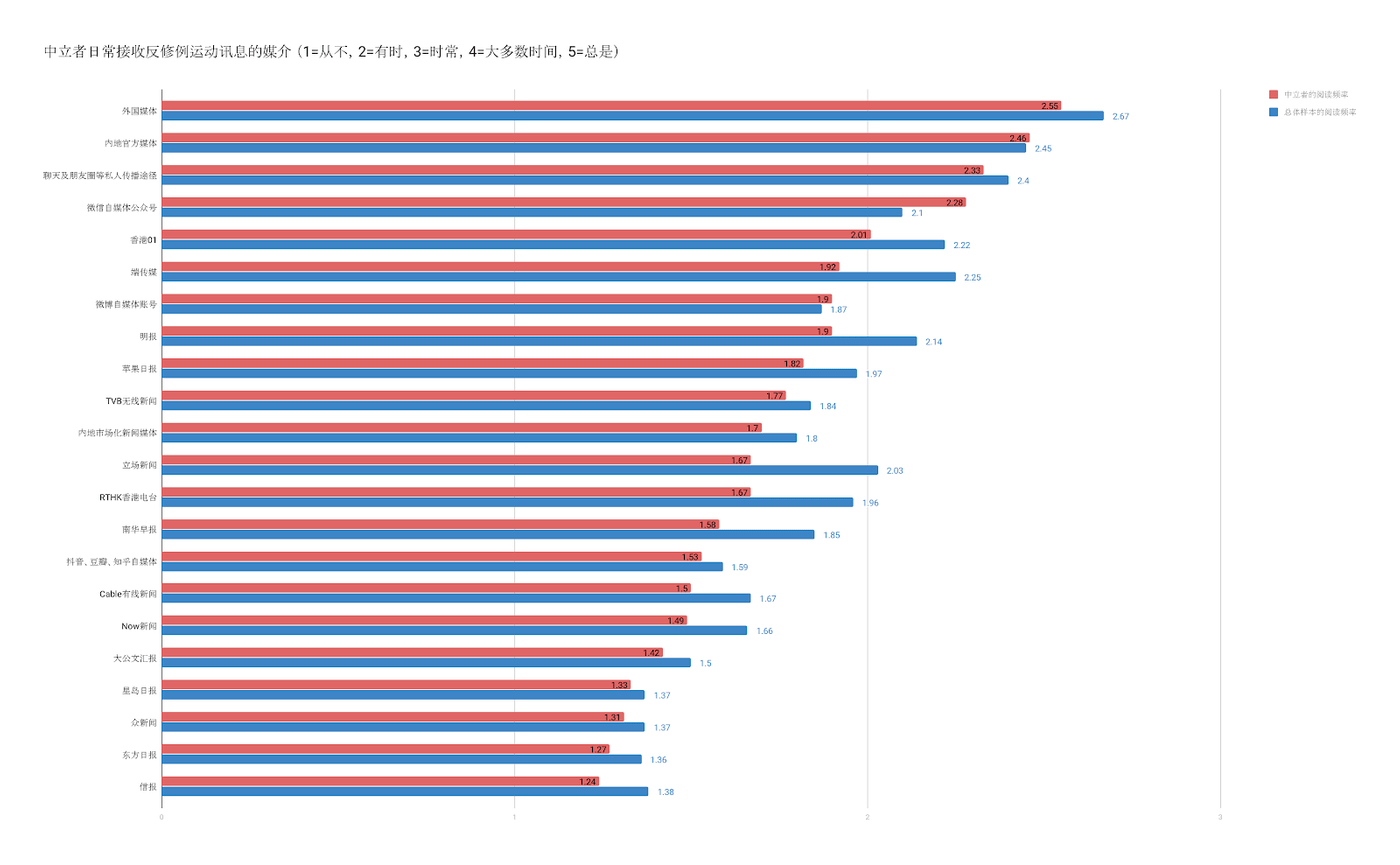
In terms of understanding of concepts related to Hong Kong politics, participants who were neutral in this anti-amendment movement had a lower understanding of most concepts than the overall sample, but they were less aware of the five major demands, the July 1 impact on the Legislative Council, and the July 2 The understanding of the five concepts of the Yuen Long violence incident, the August 13 airport violence incident and the double universal suffrage was higher than that of the overall sample.
*1=haven’t heard, 2=heard but don’t understand, 3=heard but understand less, 4=heard and understand, 5=heard and fully understand
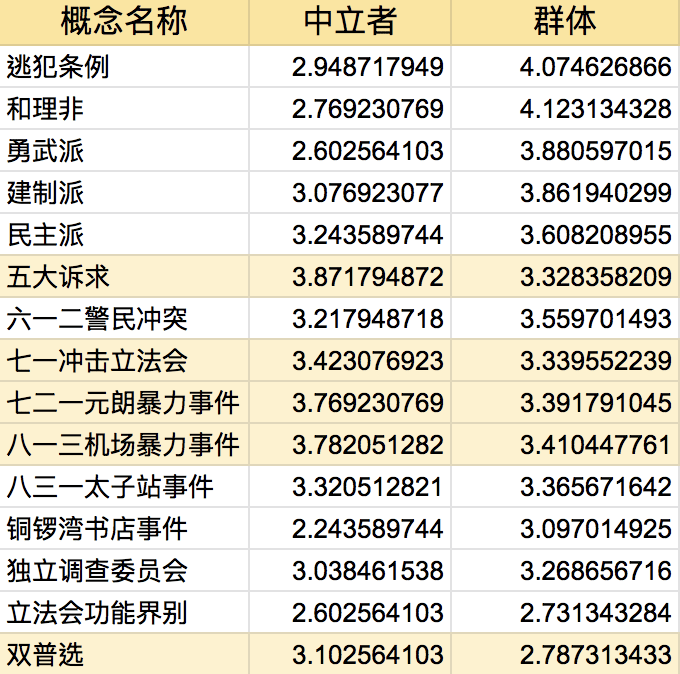
Calculation formula: degree of understanding = (never heard*1+heard but don’t understand*2+heard but less understanding*3+heard and relatively understanding*4+heard and fully understand*5) / sample size
Among the 78 people who hold a neutral attitude towards the anti-amendment movement, 48.7% hold a neutral attitude towards the extradition bill that the Hong Kong government wants to revise, 29.5% approve, 20.5% disapprove, and 1.3% do not understand. The proportion of neutral attitudes is higher than 29.9% of the overall sample.
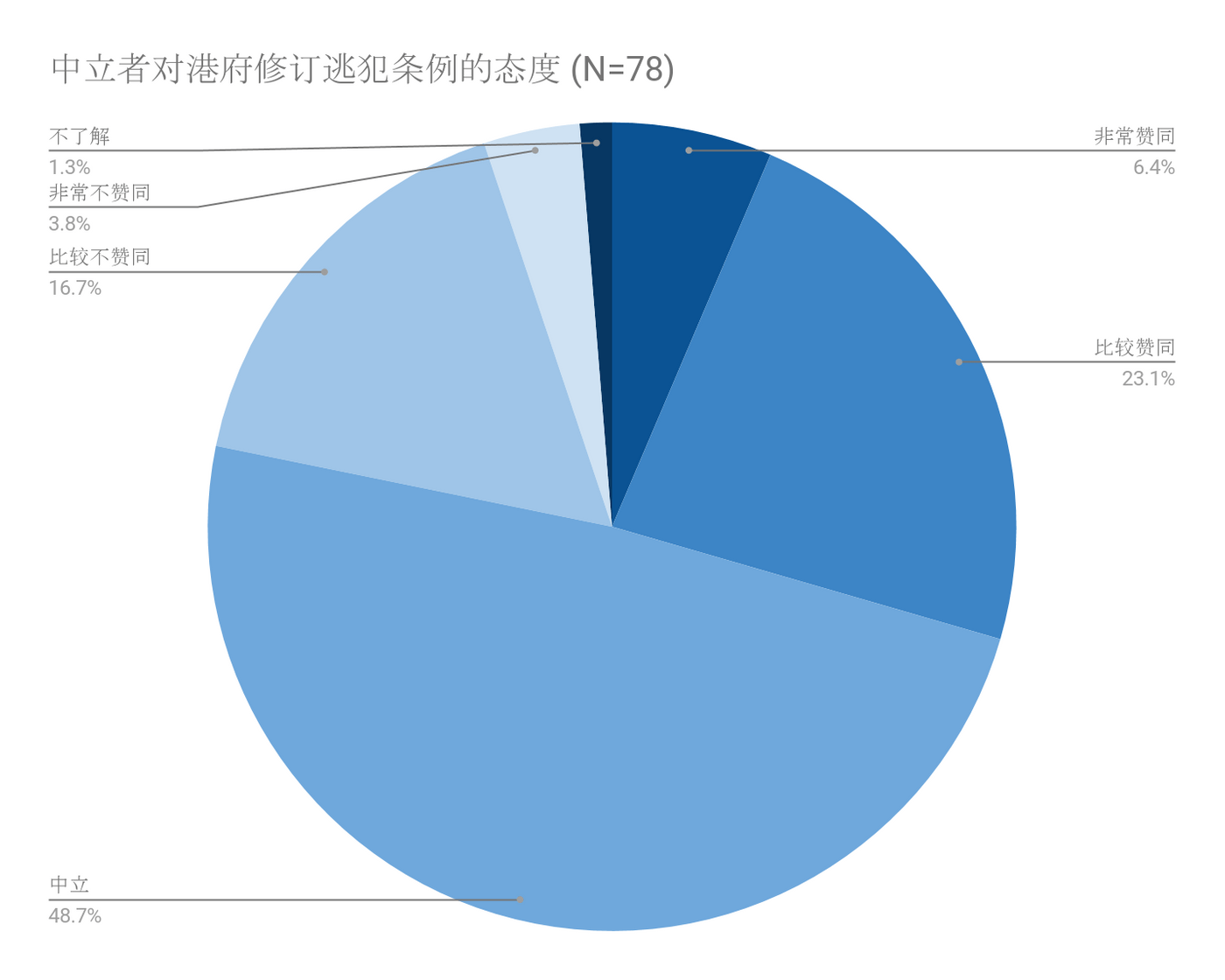
In terms of attitude towards the five demands, 60.3% of neutrals support the establishment of an independent investigation committee, and 0 people are very opposed to the establishment of an independent investigation committee; 51.2% of neutrals support the formal withdrawal of the Fugitive Offenders Ordinance 68% of neutrals are opposed to "stop prosecuting demonstrators and release arrested persons", and 0 strongly support "stop prosecuting demonstrators and release arrested persons"; 39.7% of neutrals are opposed to "achieving dual true universal suffrage" Be neutral.
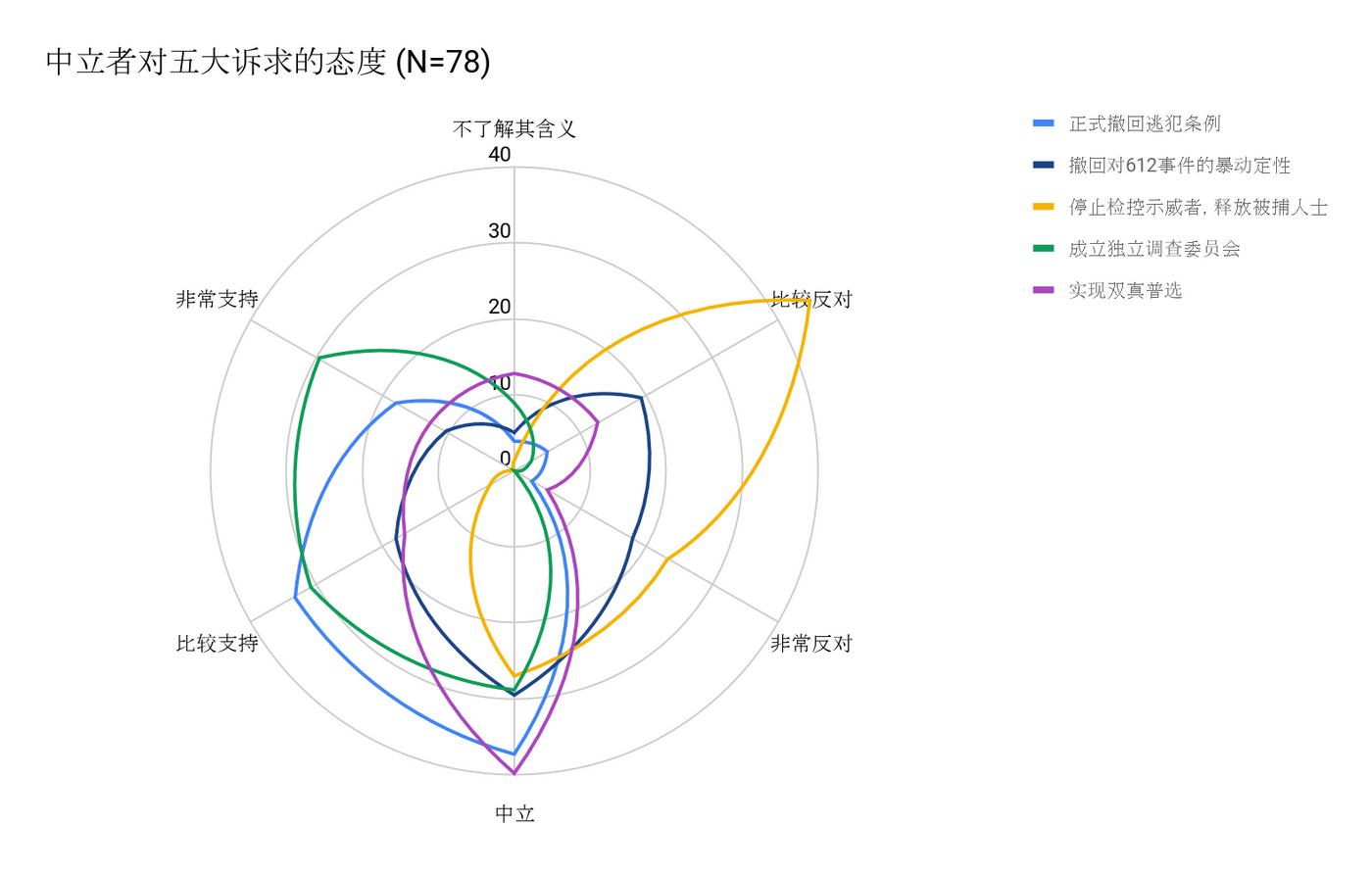
In terms of the slogan, only 2 neutrals were opposed to "Hong Kong people, come on", 47 supported the slogan; 11 opposed "no injury, no blood, no arrest", and 33 Support for this slogan; no more than 10 neutrals support other slogans, and 0 of them support "Liberate Hong Kong, Revolution of the Times" and "No thugs, only tyranny". Compared with other slogans, 28 people chose not to understand the meaning of "no thugs, no tyranny".
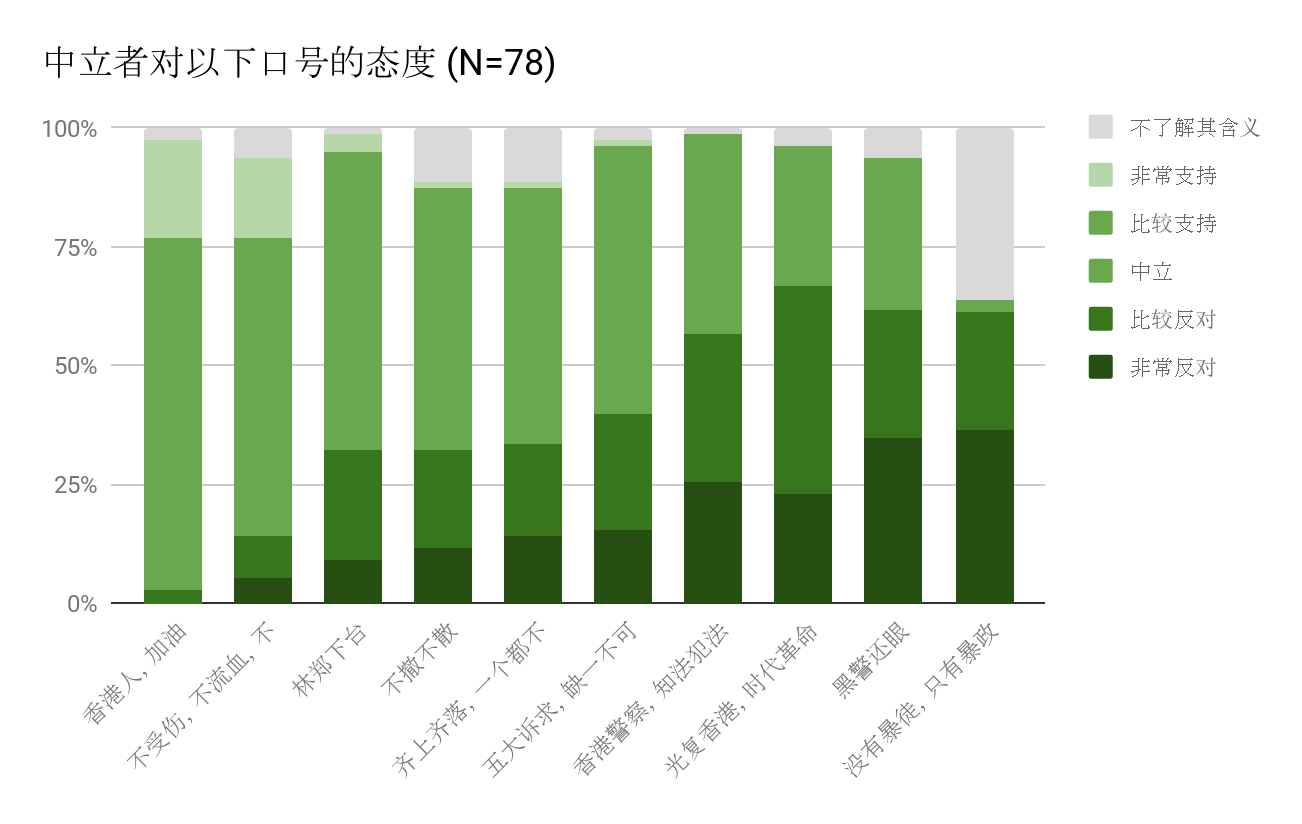
In terms of protest methods, 0 of the neutrals were opposed to peaceful marches and assemblies, 8 were opposed to the Lennon Wall, and 17 and 31 were opposed to the refusal of consumption in specific places and the promotion of Airdrop. 0 people are very supportive of strikes, strikes and strikes, and the opposition rate of strikes is much higher than that of strikes and strikes. 0 support other methods of protest, such as attacking the Legislative Council. Among them, the number of people who opposed the destruction of MTR facilities and tripping was the highest, with 74 people.
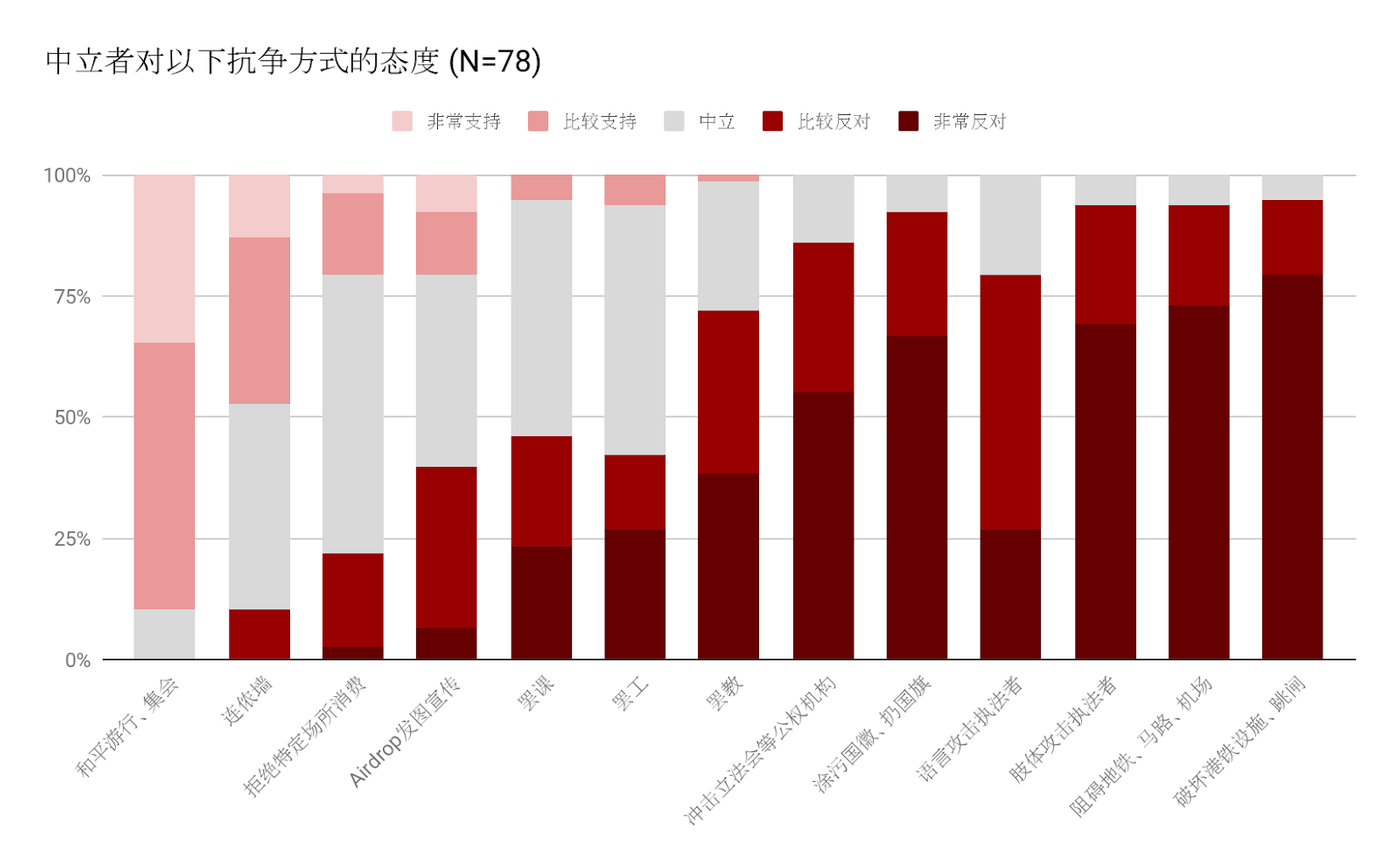
In terms of evaluation of group performance, 55 neutrals were disgusted with the demonstrators' performance, followed by 51 and 46 respectively with mainland media and Hong Kong media, and 13 with the police. It should be pointed out that 0 of the neutrals chose to have a relatively favorable or very favorable impression of the Hong Kong government, and 7 of them chose to have a relatively favorable or very favorable impression of the central government.
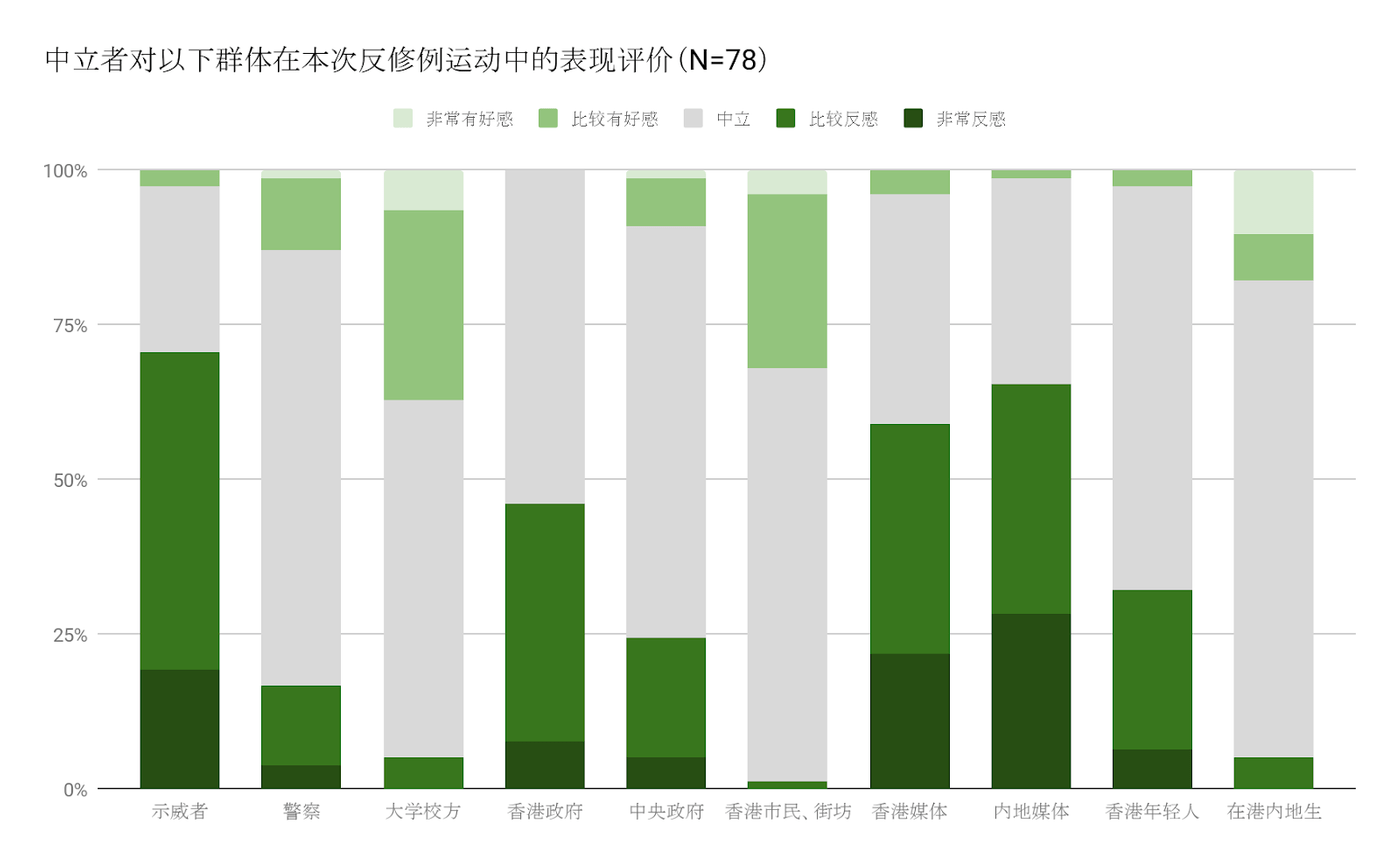
Most of the neutrals discussed the campaign with their peers and parents. It is worth noting that even though these 78 people thought they had a neutral attitude towards the anti-amendment movement in the questionnaire, 7 people had expressed their support for the anti-amendment movement in the WeChat Moments, and 8 people had expressed their opposition to the movement in the WeChat Moments. ; 4 people expressed support on Weibo and other mainland social media, 5 people expressed opposition on Weibo and other mainland social media; 5 people expressed support on Facebook and other off-the-wall social media, and 2 people on Facebook and other off-the-wall social media objected to above.
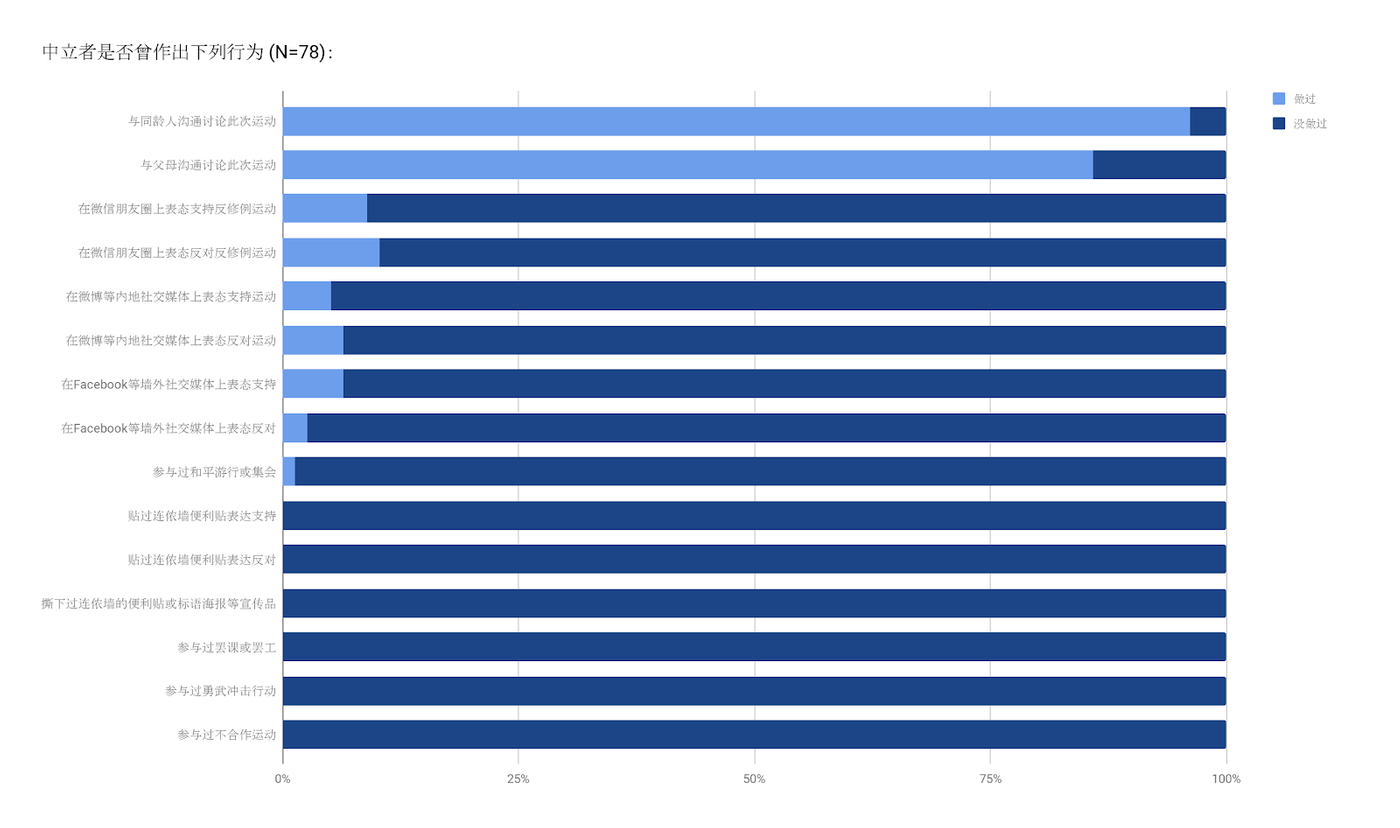
67.9% of neutrals believe that safeguarding freedom and human rights is as important as safeguarding national interests. 12.8% of neutrals believe that the interests of the country and the nation are more important, which is higher than that of neutrals (6.4%) who believe that individual freedom and human rights are more important.
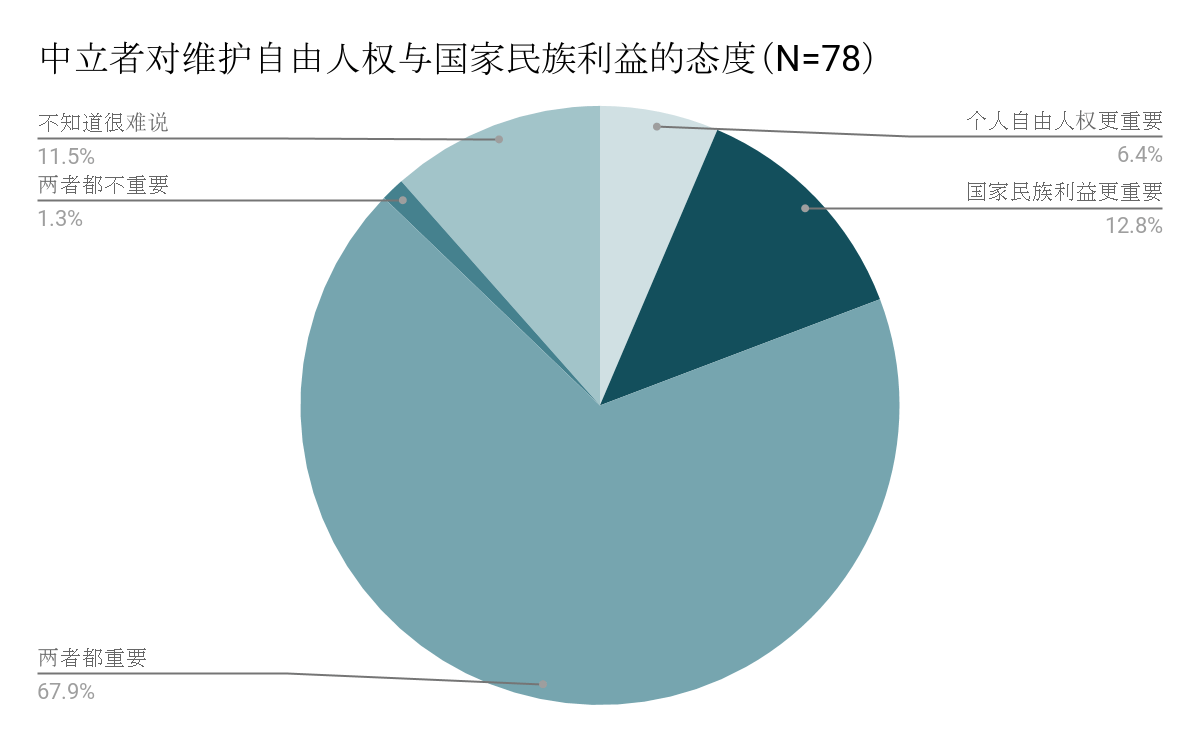
Regarding the actions of the mainland students who came to power at the class strike rally on September 2, 8.9% of the neutrals supported the classmates' actions, and 52.5% said they were somewhat or very disapproved. Compared with the overall sample, none of the neutrals were very supportive.
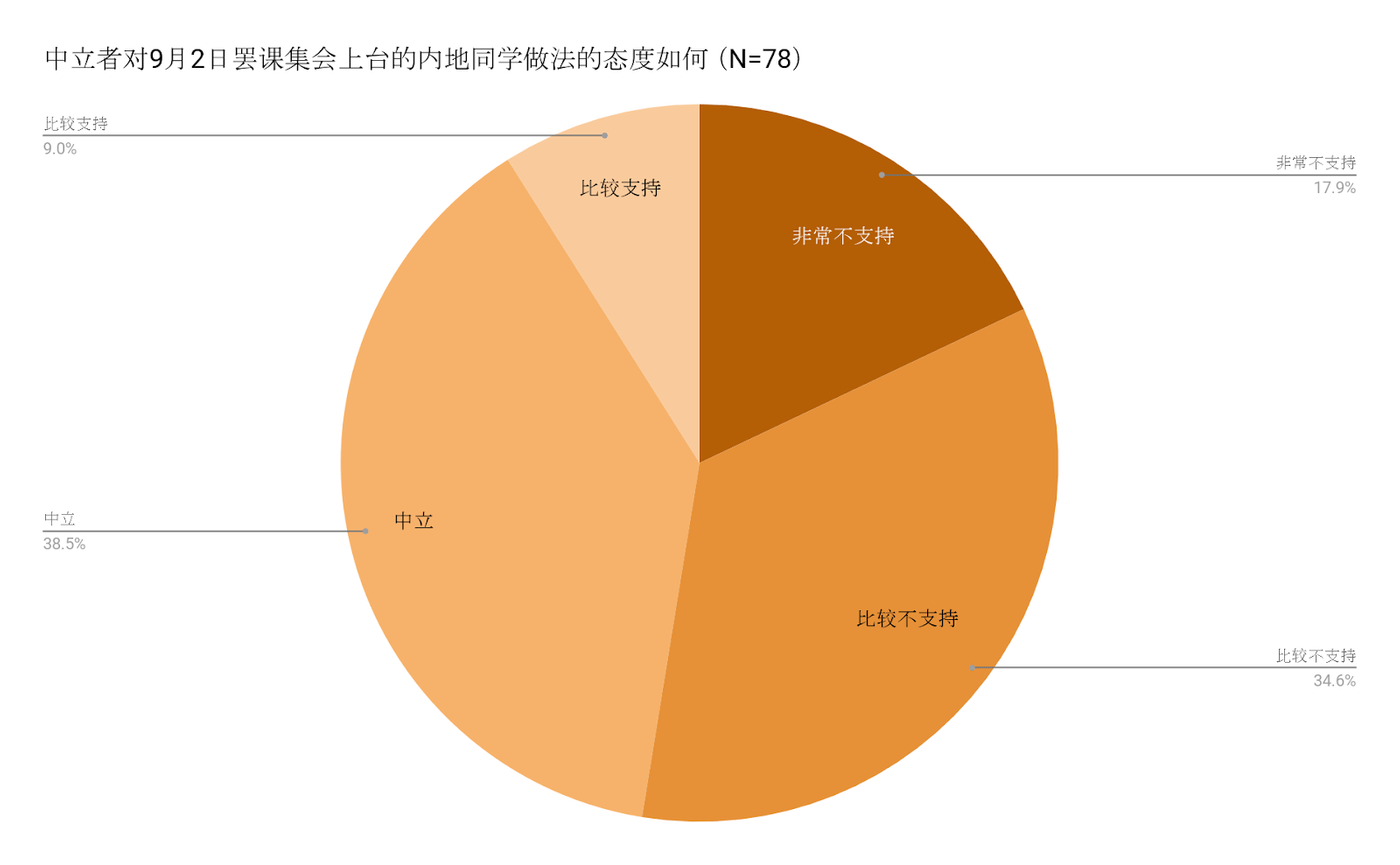
Among the 7 neutrals who supported the behavior of students in red, the most (5) agreed that university is a place to study and should not be a place for political wrangling. What students in red said: "These strikers are not worthy of College students", in line with their position.
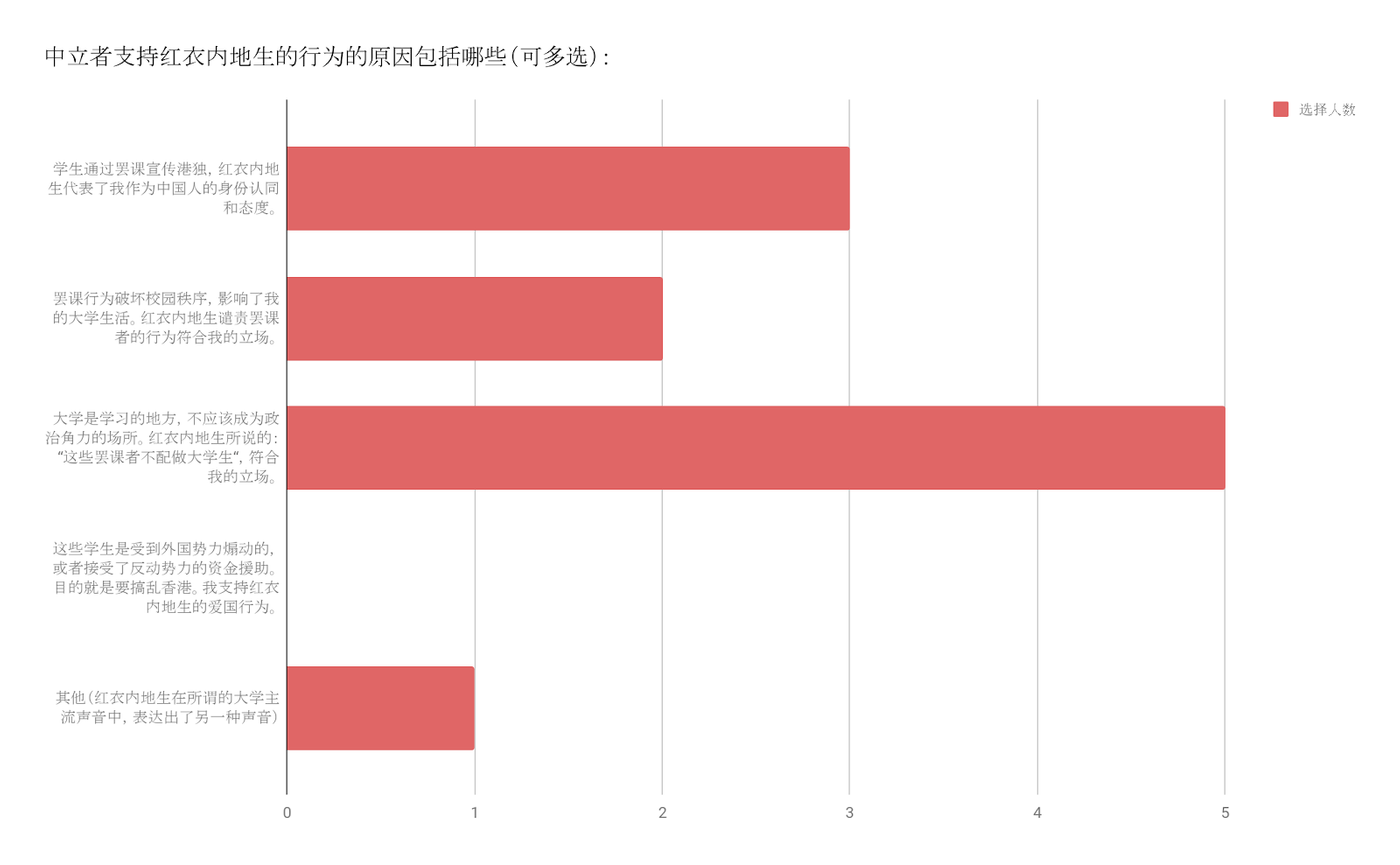
Among the 41 neutrals who did not support or strongly disagree with the behavior of students in red shirts, the largest number (27 people) agreed that school strikes are a legitimate way for students to express their demands, and students in red shirts need to respect the position of others. 4 people chose other reasons for not supporting, and they all wrote that they believed that the behavior of students in the red shirt did not pay attention to their own safety and might put themselves in danger, so they did not support the behavior of students in this area.
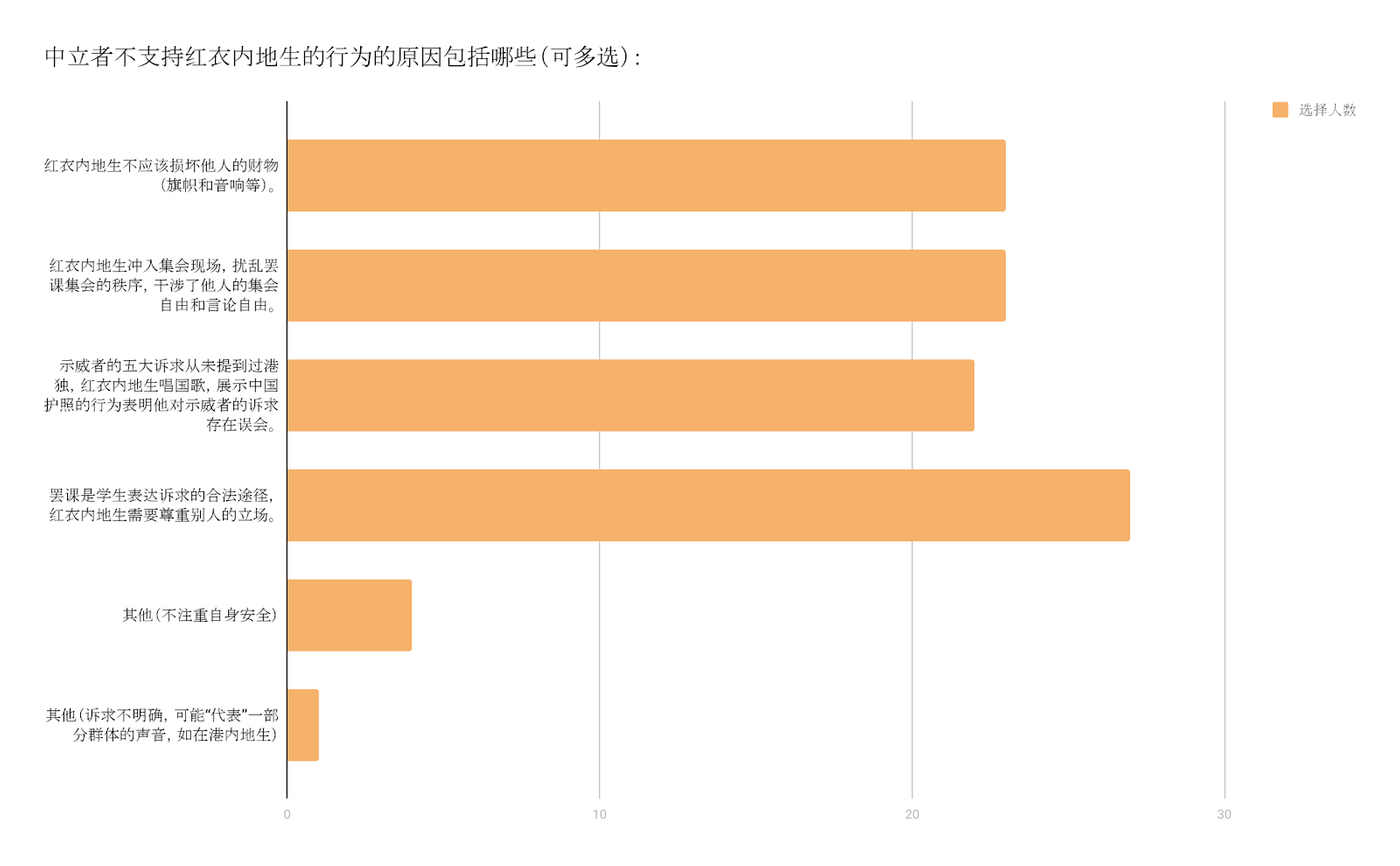
33.3% of neutrals believe that stability is the most important value of social development, surpassing the rule of law that is most valued in the overall sample. The ranking of other values by neutrals is more consistent with the overall sample. Notably, only 2.5% and 1.2% of neutrals ranked freedom and democracy first.
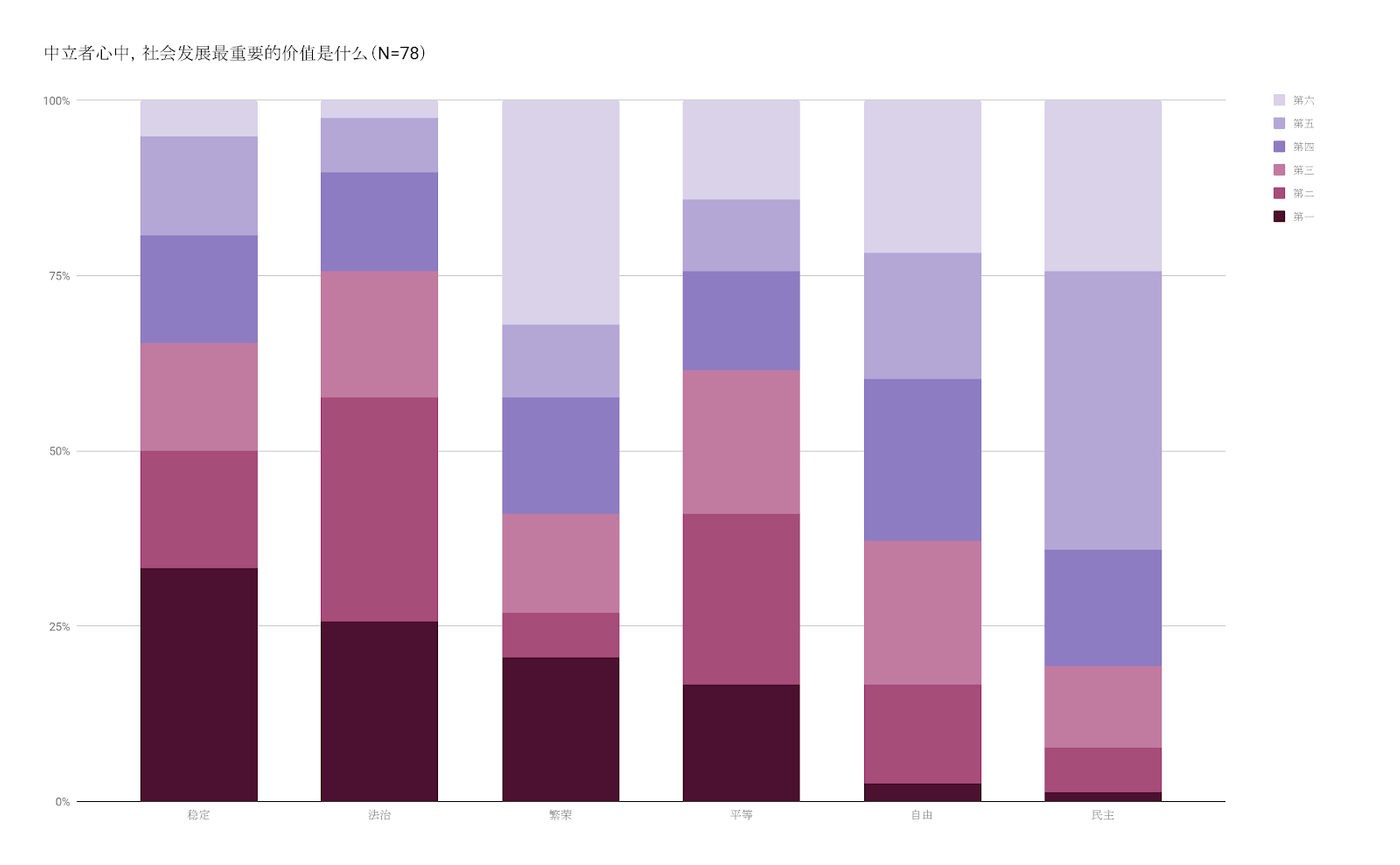
about us:
We are a group of mainland undergraduates from the Chinese University of Hong Kong. In the social turmoil that lasted for months, we observed a group in the vortex: they faced a war between their homeland and a foreign land, and it was difficult to identify their place in the chaos; they were often burdened by two The mixed image that Fang imposes also makes it easier to struggle with the predicament of identity.
They are mainland students studying in Hong Kong. Therefore, we formed the Shancheng Student Research Group, hoping to objectively describe the face of this group through academic research, and to break the myths and stereotypes projected on this group by the outside world. We try to outline the diverse voices within this group because we believe that each individual has the right to have a voice, rather than being represented collectively.
We know that there are still many imprecisions and imperfections in this research, and readers are welcome to criticize and correct. If you have any ideas or suggestions, please contact us via our Facebook page (@山城studentsstudygroup).
Like my work?
Don't forget to support or like, so I know you are with me..
Comment…